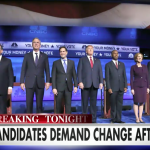Media Bits and Bytes - Three-Card Monte Edition

- ’60 Minutes’ Pushes National Security Propaganda To Cast Snowden, Manning As Traitors - Kevin Gosztola (Shadowproof)
- The GOP's Debate Debacle: Will Republicans Get Away With Bullying The Media? - Eric Boehlert (Media Matters)
- Americans are Paying More for Broadband Speed but Getting Less - David Lazarus (Los Angeles Times)
- Was Ohio's Marijuana Vote Stolen? TV Screen Shots Show Massive Number of Votes Flipping - Bob Fitrakis and Harvey Wasserman (Alternet)
- What the Library of Congress Decided This Week About 3D Printing - Dallas Harris (Public Knowledge)
- Margaret Atwood On How Tech Influences Creativity - Joe Berkowitz (Fast Company)
’60 Minutes’ Pushes National Security Propaganda To Cast Snowden, Manning As Traitors
By Kevin Gosztola
November 9, 2015
Shadowproof
The television program, “60 Minutes,” aired a segment on Sunday in which it assassinated the character of Chelsea Manning and Edward Snowden, and even went so far as to question their loyalty to America. The two whistleblowers were compared to the Washington Navy Yard shooter, who killed twelve people.
Using language that would scare everyone’s grandparents, the CBS show used “fugitive” to describe Snowden, “convicted spy” to describe Manning (even though she is not), and “mass murderer” to describe the Navy Yard shooter Aaron Alexis. Anchor Scott Pelley amplified the terror by adding they all had “one thing in common: U.S. government security clearances which they turned into weapons.”
The GOP's Debate Debacle: Will Republicans Get Away With Bullying The Media?
By Eric Boehlert
November 3, 2015
Media Matters
By suspending a Feb. 26 debate scheduled to be hosted by NBC News and the NBC-owned, Spanish-language network Telemundo, Republicans signaled that the latest bout of media catcalls from the right -- catcalls that have been part of working the refs for decades -- have attained almost mythical status.
Republicans, in mid-game, are now trying to dictate the terms of the debates. Donald Trump is even negotiating directly with television executives in an effort to alter the content and format. The unprecedented blitz sends a clear message that if moderators aren't nice to candidates and if there are any objections over "tone," future debates might get yanked.
Americans are Paying More for Broadband Speed but Getting Less
By David Lazarus
October 30, 2015
Los Angeles Times
This week, the New York attorney general's office sent letters to Time Warner Cable, Verizon Communications and Cablevision asking why some customers experience reduced download speeds.
The problem is by no means limited to New York. Californians and denizens of most other states pay some of the highest broadband prices in the world for speeds that frequently eat the dust of faster services abroad.
Was Ohio's Marijuana Vote Stolen? TV Screen Shots Show Massive Number of Votes Flipping
By Bob Fitrakis and Harvey Wasserman
November 6, 2015
Alternet
Televised screen shots taken Tuesday night of live election returns in Ohio provided by the Secretary of State's office showed hundreds of thousands of votes flipping from the "yes" to "no" column of Issue 3, the ballot measure to legalize marijuana.
When seen against the backdrop of Ohio's longstanding history of Republicans manipulating the vote count to obtain the outcome they seek, such as in the 2004 presidential election when Ohio returns elected George W. Bush to a second term, there are compelling reasons to question the official result where the pot measure went down to defeat.
What the Library of Congress Decided This Week About 3D Printing
By Dallas Harris
October 30, 2015
Public Knowledge
In November 2014, Public Knowledge petitioned the Copyright Office for a number of exemptions to the prohibition against circumventing technological protection measures (i.e. “digital locks”) protecting copyrighted works under Section 1201 of the Digital Millennium Copyright Act.
One of the exemptions we sought would allow users of 3D printers to use the replacement feedstock (i.e. the 3D printer equivalent of replacement ink cartridges or laser printer toner cartridges) of their choice. Earlier this year, we also filed comments in support of the exemption. We made this effort to ensure manufacturers of 3D printers could not use copyright law to lock printer users into using only expensive “brand name” replacement feedstock.
Fortunately, the Library of Congress, at the recommendation of the Copyright Office, granted our request, permitting users to use replacement materials that are not authorized by the printer’s manufacturer without running afoul of copyright law. However, that we even needed to seek permission for something so simple and beyond the purpose of copyright law highlights why Public Knowledge supports efforts to reform Section 1201 and end the absurdity of needing exemptions like this one. Nevertheless, this is a win for competition, tinkerers, and consumers, at least in principle. Unfortunately, the win comes with significant caveats, which we’ll discuss in a moment.
Margaret Atwood On How Tech Influences Creativity
By Joe Berkowitz
October 29, 2015
Fast Company
In the latest thought-provoking, dystopian parable from noted words-genius, Margaret Atwood, society is experimenting with becoming a prison. The entire population of the unsettling community of Positron, as depicted in The Heart Goes Last, spends half the time as prisoners and half the time as guards. It does not go great. Considering that the story also involves sex-robots and other misfit gadgetry, the central premise serves as an apt metaphor for our occasionally adversarial relationship with technology. Mostly, it seems as though we're the ones in charge, but sometimes it feels like the other way around. Are we influencing technology or is technology influencing us?
